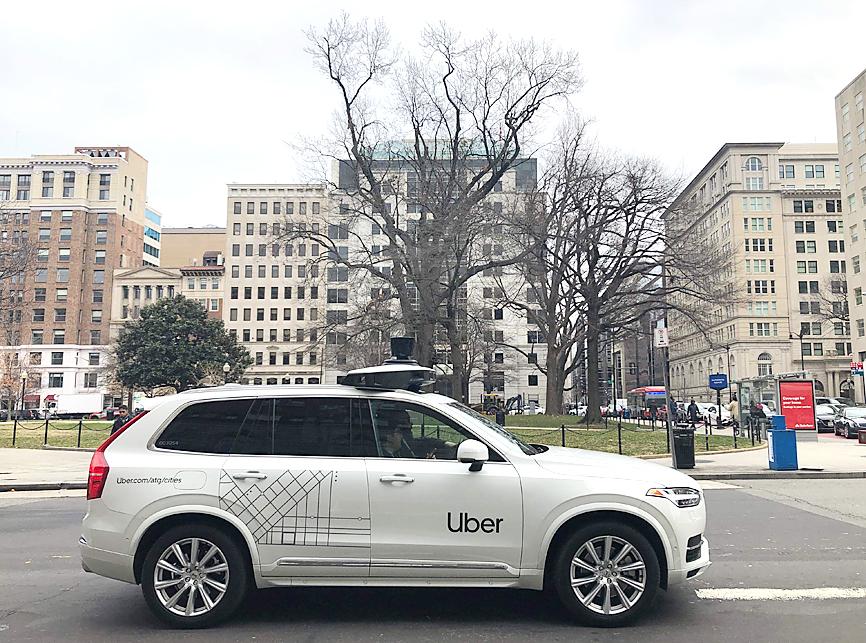Uber Technologies Inc has agreed to sell its autonomous vehicle division to Aurora Innovation Inc in a deal that gives the ride-hailing company a stake in the start-up developing self-driving technology, the companies said on Monday.
As part of the deal, Uber is to invest US$400 million in Aurora to merge the teams from both firms seeking to advance the technology for autonomous ride-hailing and is to hold a 26 percent stake in Aurora.
“By adding the people and technology of Uber’s Advanced Technologies Group [ATG] to the incredible group we’ve already assembled at Aurora, we’re shifting the landscape of the automated vehicle space,” said Chris Urmson, cofounder and chief executive of Aurora, which has been backed by Amazon.com Inc, Fiat Chrysler Automobiles NV and Hyundai Motor Co, among others.

Photo: AFP
The sale of Uber’s autonomous driving unit, which was temporarily stalled several years back after a fatal crash, comes as it streamlines operations to navigate a downturn caused by the COVID-19 pandemic.
Uber does not appear to be giving up on self-driving vehicles, which have been part of its vision for a profitable ride-share business, but is instead swapping the unit for a stake in Aurora.
“With the addition of ATG, Aurora will have an incredibly strong team and technology, a clear path to several markets, and the resources to deliver,” Urmson said.
“Simply put, Aurora will be the company best positioned to deliver the self-driving products necessary to make transportation and logistics safer, more accessible, and less expensive,” Urmson added.
Along with acquiring ATG, Aurora announced a strategic partnership with Uber to mesh its technology with that of the leading ride-hailing service, the companies said.
The companies expect self-driving technology to be initially put to use for long-haul trucking.
Uber chief executive Dara Khosrowshahi is to join the Aurora board of directors as part of the deal.
The merged firm is to work on technology to be known as Aurora Driver.
“Few technologies hold as much promise to improve people’s lives with safe, accessible, and environmentally friendly transportation as self-driving vehicles,” Khosrowshahi said.
“I’m looking forward to working with Chris, and to bringing the Aurora Driver to the Uber network in the years ahead,” he said.

NEW IDENTITY: Known for its software, India has expanded into hardware, with its semiconductor industry growing from US$38bn in 2023 to US$45bn to US$50bn India on Saturday inaugurated its first semiconductor assembly and test facility, a milestone in the government’s push to reduce dependence on foreign chipmakers and stake a claim in a sector dominated by China. Indian Prime Minister Narendra Modi opened US firm Micron Technology Inc’s semiconductor assembly, test and packaging unit in his home state of Gujarat, hailing the “dawn of a new era” for India’s technology ambitions. “When young Indians look back in the future, they will see this decade as the turning point in our tech future,” Modi told the event, which was broadcast on his YouTube channel. The plant would convert

‘SEISMIC SHIFT’: The researcher forecast there would be about 1.1 billion mobile shipments this year, down from 1.26 billion the prior year and erasing years of gains The global smartphone market is expected to contract 12.9 percent this year due to the unprecedented memorychip shortage, marking “a crisis like no other,” researcher International Data Corp (IDC) said. The new forecast, a dramatic revision down from earlier estimates, gives the latest accounting of the ongoing memory crunch that is affecting every corner of the electronics industry. The demand for advanced memory to power artificial intelligence (AI) tasks has drained global supply until well into next year and jeopardizes the business model of many smartphone makers. IDC forecast about 1.1 billion mobile shipments this year, down from 1.26 billion the prior

People stand in a Pokemon store in Tokyo on Thursday. One of the world highest-grossing franchises is celebrated its 30th anniversary yesterday.

Zimbabwe’s ban on raw lithium exports is forcing Chinese miners to rethink their strategy, speeding up plans to process the metal locally instead of shipping it to China’s vast rechargeable battery industry. The country is Africa’s largest lithium producer and has one of the world’s largest reserves, according to the US Geological Survey (USGS). Zimbabwe already banned the export of lithium ore in 2022 and last year announced it would halt exports of lithium concentrates from January next year. However, on Wednesday it imposed the ban with immediate effect, leaving unclear what the lithium mining sector would do in the